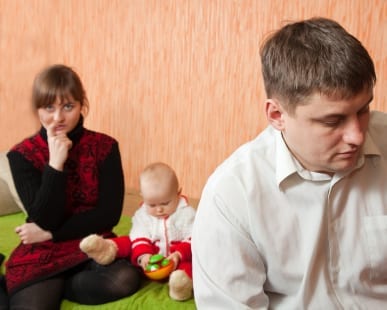
Did you know that men can also get postpartum depression? It’s true. In fact, it actually has a “name” called Paternal Postnatal Depression (PPND).
Over 1,000 new fathers in the United States become depressed. The statistics have ranged from 1 in 10 to 1 in 4 new dads who have PPND. The exact number really doesn’t matter. The point is that many men are suffering in silence with postpartum depression. Not surprisingly, if the mother experiences postpartum depression, the father is more likely to have it as well.
Interestingly, although we know hormones play a significant role in the emotional stability of the mother during and after the birth, men’s hormones can change before and after the birth, as well. For example, testosterone levels dip, and estrogen and prolactin increase in males before and after their spouse gives birth.
Men may also experience a drop in their stress hormone, cortisol, which can contribute to feelings of depression. The evolutionary thinking is that these fluctuations in men’s hormones may encourage them to stick around and help with their offspring when the stress is greatest.
Bringing Baby Home
Looking through the recent magazines of babies and parenting, one has the expectation of happiness, bliss, and fulfillment. There aren’t generally photos of an unhappy mother or father with an unhappy baby.
However, the reality is not pretty. There is a marked decrease of sleep, the anxiety, and worry about every little sign that something may not be right, constant questioning if you are meeting the needs of a tiny little helpless human being. Your spouse is perhaps feeling left out of the mother-baby bonding, and the increased isolation compounds and increases the chances of depression and/or a mood disorder. Especially if you have a family history of depression or anxiety. While your spouse may be experiencing the “baby blues” immediately following the birth of the baby, your symptoms tend to increase over time during the first year following the birth of your baby.
Critical Period
Men tend to be experiencing PPND approximately 3 to 6 months post-birth. The reasons tend to point to sleep deprivation as men take on more and more responsibility of helping with the nighttime feedings and giving mom a much needed break at the end of the day, or perhaps giving her time to rest. Men experience less control over the “free time” they used to have, and the quality of the marital relationship is under a new type of stress. The reality of life has taken on a new identity and so has he as a new father. He may have feelings of guilt, anxiety, and even sadness.
Initially many of the signs may be difficult to discern. There may be the textbook symptoms of depression, but sometimes PPND manifests itself in unconventional ways such as: increased irritability, easily angered, increase in use of alcohol and/or drugs, violent behavior, losing weight, increased impulsiveness and risk taking behaviors (i.e. reckless driving), increased complaints about physical problems, feeling discouraged, ongoing physical symptoms, like headaches, digestion problems or pain, problems with concentration, loss of interest in sex, or conversely working constantly, avoiding being at home, disinterest in the baby, experiencing conflict between how you think you should be as a man and how you actually are, and thoughts of suicide.
PPND needs to be treated just as you would treat diabetes or a broken ankle. Taking the first step to get help is a sign of strength not weakness. When PPND goes untreated it can wreck havoc on everything in your life. Talk therapy can help in conjunction with a psychiatric evaluation, when indicated. Couples counseling can not only be therapeutic but the perfect anecdote to feeling alone, helping one another to feel closer, and working out any resentments that may have built up either through disappointments or misunderstandings. Additionally, men’s groups for new fathers are a great way to truly know you are not alone and to bond with other new fathers. Ivy & Osborn offers a New Dads’ group and Pregnancy groups. Both are great ways to meet and network with other new dads and dads-to-be in your area.
Taking care of yourself is the best thing you can do for your family.





